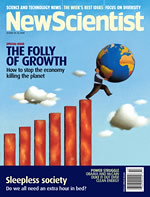 It is a sign of the times when a leading publication like the New Scientist runs an issue with 15 inside pages and it’s front cover questioning economic growth. What would have been heresy only last year is now mainstream. Even “peak oil” and “transition towns” get a mention!
It is a sign of the times when a leading publication like the New Scientist runs an issue with 15 inside pages and it’s front cover questioning economic growth. What would have been heresy only last year is now mainstream. Even “peak oil” and “transition towns” get a mention!
The lead article sets the scene with the following question:
“How do we square Earth’s finite resources with the fact that as the economy grows, the amount of natural resources needed to sustain that activity must grow too? It has taken all of human history for the economy to reach its current size. On current trends it will take just two decades to double.”
In his article “What politicians dare not say” Tim Jackson of the UK Sustainable Development Commission explains the catch-22 situation we are in:
“Consuming less may be the single biggest thing you can do to save carbon emissions, and yet no one dares to mention it. Because if we did, it would threaten economic growth, the very thing that is causing the problem in the first place.”
Herman Daly, founder of the field of ecological economics and former economist with the World Bank, picks up on the limits to growth:
“The scale of the global economy is approaching the limits of what our planet can cope with. As the oceans are emptied of fish, forests shrink from logging and levels of pollutants and green house gases in the atmosphere rise, the environment and social costs of further growth are likely to intensify. Resources are running out and waste sinks are becoming full. The remaining natural world can no longer support the existing economy, much less one that continues to expand.”
Questioning the myth of the “trickle-down” economy Andrew Simms of the New Economics foundation illustrates how far we have already exceeded the planet’s carrying capacity:
“Humanity has been overshooting the biosphere’s capacity to sustain our activities every year since the mid 1980s, and each year we do it sooner. In 2008 we had consumed the ration for the year by 23 September. It would take at least three Earths to sustain us if everyone had the lifestyle of people in the UK; five if we all lived like Americans.”
Canadian activist David Suzuki writes on how overpopulation is not just a question of numbers but of affluence and over-consumption:
“LImitless resources are a fool’s dream that we can never achieve. The industrialised world has only 20% of the Earth’s population but uses more than 80% of the resources and produces 80% of the waste. The reason we have the illusion that everything is OK is because we’re using up what our children and grandchildren should expect to inherit.”
Using a transition town tool another article points the way forward with a positive vision 10 years from now:
“It’s 2020 and we are a decade into a huge experiment in which we are trying to convert our country to a sustainable or “steady-state” economy. We have two guiding principles: we don’t use natural resources faster than they can be replenished by the planet, and, we don’t deposit wastes faster than they can be absorbed. We have escaped the doomed model of economic growth and no one is worse off. It’s even possible that we have all become a little bit happier.”
Finally, philosopher Kate Soper argues that breaking our dependence on profits and growth would make our lives better, not worse:
“People would reclaim time for personal and family life. They would commute less and enjoy healthier modes of travelling such as walking, cycling and boating. Supermarket shopping would cede to a resurgence in local stores, making town centres more individual and boosting local communities. All this would tranform urban and rural living, and provide more tranquil space for reflection now denied by harried travel and work routines.”
An inspiring set of articles and very encouraging to see them debated in a mainstream publication.

‘We thus have any interesting problem, economic growth is unsustainable for a variety of reasons, however it is inherent in a modern capitalist economy. Providing alternatives to capitalism is no easy task but it is necessary. I suspect that ultimately it is easier to change the economic system than basic ecological realities, however most commentators reverse my approach’
http://another-green-world.blogspot.com/2008/10/why-system-requires-economic-growth.html is my analysis that went towards the Sustainable Development Commission discussion on growth, that is in turn debated in New Scientist.
[…] is all you really need to know. It is concise and too the point and far better than any of my blatherings. Great as an introduction to a talk or discussion on economics and sustainability. The clip […]